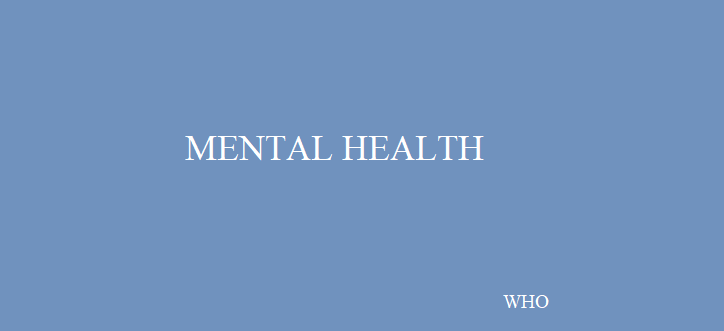 THE World Health Organisation’s world mental health report says mental health is the leading cause of disability. How did the pandemic impact our mental health? What are the signs and how can we keep ourselves mentally healthy? WHO’s Dr Mark Van Ommeren explains; Q: The WHO report says that mental health is a leading cause for disability. Explain please. OMMEREN: WHO does advanced calculations to come up with such a conclusion. The calculations are reached from different sources of information. One of them is that when an individual has a mental health condition such as depression, it’s impairing. In many workplaces, the leading cause of people on sick leave is mental health conditions, although that’s often not said. They start in their teenage years, in adolescent years, and largely untreated. Less than one in three people around the world are getting mental health care for their condition. Q: How has the pandemic impacted mental health and how can we recognise the signs? OMMEREN: The pandemic has been very hard on people’s lives, and shone a light on mental health. The rates went up in the first year of the pandemic for anxiety and depression. About 25 per cent more people than before had depression or anxiety. For suicide, we didn’t see the rates go up, which is good news. But we are monitoring that. People with pre-existing severe mental illness were more likely to catch the virus and be severely ill from the virus and likely to die from the virus. These are important but not highlighted enough. If you find yourself to have persistent anxiety, which you didn’t have before, persistent sadness or depression or a sad mood that you didn’t have before, or drinking more alcohol, or having lost pleasure and interest in things that you used to like, then these are concerns. And you need to either seek help or to learn about how to manage these. Q: What can people do to keep themselves mentally healthy? OMMEREN: To stay mentally healthy, one can do a number of things, such as staying physically active. It’s important for mental and physical health. Second, avoid alcohol which is often used by people to think that they would be feeling better. But it makes mental problems more complex and more difficult to overcome. Thirdly, one should do every day something that is either enjoyable or meaningful, such as talking to a friend or going for a walk. Finally, one can practise stress management techniques such as mindfulness, which is increasingly popular and is evidence-based. If you develop a mental health problem and these tips are not enough, then it will be important to seek help from a health professional. If there is no trusted health professional in your community, talk to a trusted person such as a friend or a person you think is worth discussing it with. Have them listen to you and get their feedback on how you can deal with your difficulties. What can also be helpful is self-help books and self-help materials online. When they are based on what is called cognitive-behavioural therapy, then they’re usually very good. – WHO |
Health TipsCheck out for all the latest Health Tips on this page. Follow us on social media as well. ...Your Health is your Life!.... Categories
All
Healths News and Tips in Your Email: Subscribe Now |
- Home
- PNG Health News
- Health Tips
- Jobs
- Health Scholarships
- Nursing Colleges in PNG
- Health Ministry
- Private Hospitals in PNG
- Health Department
- Insurance
- Institutions
- CHW Colleges in PNG
- Health Issues
- About
- Contact
- Privacy Policy
- COVID-19 in Papua New Guinea
- Enga School of Nursing
- PNG Health Database
- Hospitals in PNG
|
Home : News : Health Insurance : Training : Health Training Institutions : Hospitals : Provincial Hospitals : Contact: Privacy Policy
|
 RSS Feed
RSS Feed
